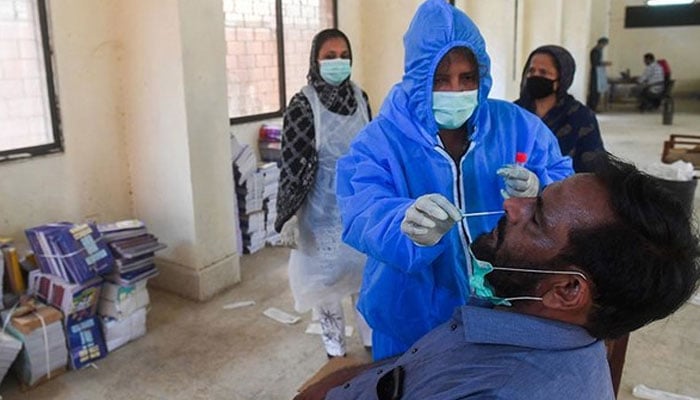Pakistan reports first case of highly infectious Omicron sub-variant
NIH says it detected a case of Omicron sub-variant BA.2.12.1 through genome sequencing
ISLAMABAD: Pakistan on Monday reported its first case of highly infectious Omicron sub-variant BA.2.12.1, according to the National Institute of Health (NIH).
Taking to Twitter, the NIH said it detected a case of Omicron sub-variant BA.2.12.1 through genome sequencing. It said that the new sub-variant is causing an increasing number of COVID-19 cases in different countries.
The NIH advised people to take the best preventive measure to avoid contracting the virus, which is vaccination against it.
"We strongly recommend getting vaccinated and all those due for boosters must get the shots immediately," the tweet read.
On March 31, Pakistan announced the closure of the National Command and Operation Centre (NCOC), the body which was set up in March 2020 in the wake of the COVID-19 pandemic to collect, analyse and process information, transferring all its functions, roles and responsibilities to the NIH.
64 new COVID-19 cases reported
Pakistan reported 64 new COVID-19 cases overnight, official data issued by NIH showed Monday. With the fresh cases, the coronavirus positivity ratio stood at 0.49%. However, no deaths were reported during the last 24 hours.
Pakistanis have more or less not been following any COVID-19 related standard operating procedures since March 31, when the government scrapped all coronavirus restrictions across the country.
"The pandemic has not ended yet but undergoing the ending phase," the then planning and development minister Asad Umar had said while announcing the decision.
He said that the NCOC decided to lift all coronavirus restrictions, including protocols for indoor dining, indoor wedding events and markets, sports activities and all the other SOPs across the country after reviewing the COVID-19 situation in the country in detail.
-
Antioxidants found to be protective agents against cognitive decline
-
Coffee reduces cancer risk, research suggests
-
Keto diet emerges as key to Alzheimer's cure
-
What you need to know about ischemic stroke
-
Shocking reason behind type 2 diabetes revealed by scientists
-
Simple 'finger test' unveils lung cancer diagnosis
-
Groundbreaking treatment for sepsis emerges in new study
-
All you need to know guide to rosacea












